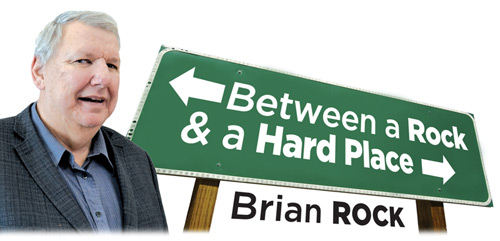Between a rock and a hard place
Six Ways that the English-speaking Community Can Help Out the Schools and School Boards in Quebec

# 1: The most direct way members of the English-speaking community can help out schools and school boards in the province of Quebec is to apply to be a substitute teacher. The teacher shortage has become even more critical with the designation of the red zones. If you are at least a high school graduate (university and/or CEGEP is even better), can pass a police check, and feel that you possess the necessary stamina and interest, please contact the human resources department of your local school board.
# 2: The processes for the election to Governing Boards as a parent, secondary student, or staff representative of your local school were completed during the month of September. However, section 42 paragraph 5 of the Education Act (chapter I-13.3) provides for “two representatives of the community who are not members of the school staff, appointed by the members elected . . . The community representatives on the governing board are not entitled to vote.” Not having the right to vote is not a problem at all; in fact, you are in good company because neither do School Principals. You possess all the other rights of other Governing Board members.
# 3: While we are on the subject of the Education Act, section 42 paragraph 3 provides: “in the case of a school providing education to students in the second cycle of the secondary level, two students in that cycle elected by the students enrolled at the secondary level or, as the case may be, appointed by the students’ committee or the association representing those students.”
The Governing Boards in secondary schools have benefitted greatly from the direct input of Secondary III, IV, and V student representatives during their deliberations. It is time for all nine School Boards to have two student commissioners providing the same youthful insight at the newly-elected Councils of Commissioners. Speak to your local School Board Commissioners to convince them that it is high time for all nine School Boards to have two student commissioners. The difficulties in the past related to the geographical distances and the expenses of bringing together representatives of the secondary student councils from all the secondary schools to select the student commissioners are greatly lessened by the popularization of ZOOM and Microsoft Teams. Let student commissioners become one of the priorities on the newly-crafted agendas and task lists of the new Councils of Commissioners.
# 4: As you are well aware, Law 40, passed through closure by the majority Coalition Avenir Québec government, has challenged our constitutional rights under section 23 of the Canadian Charter of Rights and Freedoms of the Constitution Act of 1982. So due to the COVID-19 pandemic, the advent of red zones, and Law 40, many of the talented individuals whom we would have expected to present themselves to be nominated as Chairpersons and Commissioners did not. These factors among others led to an avalanche of acclamations and some vacant wards and even one vacant chairpersonship. The elections scheduled for the contested chairpersonships and contested wards have been postponed as were the municipal by-elections scheduled for early in October. And who knows, your guess is as good as mine, as to when the elections for the vacant chairpersonship and vacant wards will be scheduled. Is there a way to ensure that the expertise necessary to manage and control our schools is still available at the nine councils of commissioners? The Education Act does actually provide one avenue that is available when needed depending on the results of the election process. Section 143 paragraph 3 allows for remediation : “if the members of the council of commissioners . . . consider it necessary, a maximum of two commissioners co-opted by a majority of at least two thirds of the council members, after consulting with the groups most representative of the social, cultural, business and labour sectors in the region.”
Subsection 143.1 further clarifies the measure available: “Co-optation under paragraph 3 of section 143 must enable persons whose competence and qualifications are considered complementary to those of the commissioners or useful for the administration of the school board to sit on the council of commissioners. The persons must meet any selection criteria determined by regulation by the Minister.”
# 5: Is there a way that you can be directly involved in enriching the educational experience of the students in kindergarden, elementary, and secondary schools. Yes, there is! In eighty (80) of the English schools across the province, there are local associations of the Quebec Federation of Home and School Associations Inc. (QFHSA) comprised of over four thousand (4,000) families who have taken out paid memberships. You may become a member. Parents, grandparents, teachers, professional and support staff members, school administrators, school board administrators, commissioners, chairpersons, and community volunteers can all join. In many of the other schools, section 96 of the Education Act provides for the formation of Parent Participation Organizations (P.P.O.’s). P. P. O.’s are like local home and school associations-in-training. Many P. P. O.’s eventually morph into local home and school associations.
# 6: Over the last decade, the English schools in Quebec have delivered the goods consistently: higher graduation rates, higher examination results, lower drop-out rates, enhanced extracurricular activities both during lunch hours and afterschool, and more involvement from parents and community members. Not only did the English schools outperform the French schools in the province, but many of the schools in surrounding educational jurisdictions as well. We should all be very proud of the above. Not only that, but the next time we meet one of the intervenors involved in our English schools and school boards, we should make the effort and take the time to congratulate: OUR teachers, school’s professional and support staff members, school administrators, school board administrators, chairpersons, and commissioners on a job so very well done!

